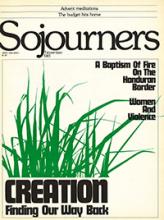First Sunday of Advent
Mark 13:32-37
In the past two years I've done two smart things: I went fishing last summer and then I went fishing again this summer. Fishing is teaching me the art of waiting. And how to wait is what this scripture and the spirit of Advent are all about.
There is the obvious parallel: The very act of fishing, like the celebration of Advent, is a ritual of hope. Both are filled with expectation; we are waiting for something.
But some similarities are more subtle. Don't be deceived by tranquil scenes of grandpa, fishing pole in hand, leaning against a tree, eyes closed, lazing away under the hot summer sun. Take it from me, to be truly fishing is to be constantly on guard. You are always watchful, always mindful, always alert for the slightest touch on the line. The attention is so focused that eventually you can feel or hear a fish circling the bait. But if the concentration breaks, even for a split second, chances are you've missed what you were waiting for.
Perhaps it's not a tragedy to lose a perch or a pike, but to think that the Messiah might have brushed your shoulder and continued by unnoticed is another story.
A peace and justice fanatic like myself who spends days dialing phone numbers, organizing demonstrations, attending meetings, writing articles, answering letters, leading workshops, and doing other important activities guaranteed to drag in the kingdom of God needs to be reminded that waiting has value. We're on a pretty tight deadline, after all. According to the experts, we have about 20 years to prevent a nuclear holocaust. There's no time to wait around.
Then Advent slips into my prayer cycle and whispers a reminder: Jesus waited to be born. No instant Messiah here.
Read the Full Article

